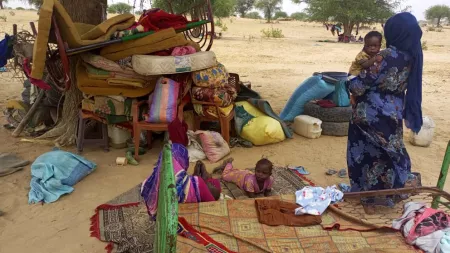N'Djamena, Chad 25 May 2023 - With the conflict in Sudan in its fifth week, CARE is deeply concerned about the impact the violence has had on hundreds of thousands of Sudanese people, especially women, and children, forced to flee their homes amid the violence. This includes over 90,000 refugees, who according to UNHCR and the Government of Chad, have fled to Chad to save their lives.
Dr. Amadou Bocoum, CARE Chad Country Director said: “Alongside our partners, we have noted that 90% of the refugees crossing over daily are women and children. By the time they arrive, they have endured extreme hardship not only from their journey but also from the situation they left at home. Many arrive hungry, thirsty, and in need of immediate medical attention and other basic necessities. We are working alongside other humanitarian actors to support those coming across the border, but we need more support.”
Despite a seven-day ceasefire that was to take effect on 22nd May 2023, there have been indications that fighting is still ongoing. Most of those fleeing the violence undertake the journey with little or no possessions. Even after crossing over the border into Chad, individuals are still not safe, as there have been reports of attacks on refugees from across the border.
Haowa fled from her village to find refuge in Kouffroun with her husband and four children soon after the conflict started. Kouffroun is directly across from Sudan, with the border only one kilometer away. Due to this proximity, Haowa believes that their only solution is to be relocated to camps further away from the border for their safety as soon as possible. Haowa lives in constant fear for her life and that of her family, wondering if she will see the next day. "Even here, we are not safe as stray bullets can hit us at any time. On 17th May 2023, bullets whizzing from the Sudan side killed 10 people and injured several more," she says.
Life in the camps is not easy for many who are relocated. In addition to rampant disease, there are reports from UNHCR indicating that one-fifth of children in camps are acutely malnourished.
Guisma, a mother of one, indicates that the living conditions are difficult She has been waiting for medical attention at a mobile clinic set up by humanitarian partners but unfortunately, it isn’t sufficient to provide services swiftly enough to the growing refugee population. "My child is six months old, and he has been sick for two days, he is just crying, I am not at peace," says Guisma.
Another source of concern is family separation. Koubra—a 46-year-old mother of six from Darfur—crossed the border into Chad separated from her family members. Koubra was in Khartoum when the fighting broke out, seeking medical care for one of her children. She is constantly worried about her other children and husband who are across the border, still in Darfur.
"The conflict broke out when I was in the hospital with my youngest child, who’s 8 years old and was sick. We were evacuated from Khartoum to Tiné, a town on the border with Sudan. I have no news of my five other children in our village in Darfur. I think about them all the time. I wanted to cross the border to see if they were still there, but the road is blocked, there is shooting everywhere and yesterday the fighters set fire to the houses on their way. This situation is really worrying as I always wonder what condition are they in?" she says with great concern.
Since the conflict in Sudan began, the CARE Chad team —who were already supporting displaced populations in the country before this current crisis—have been active in the border communities alongside local and international partners. This work has included needs assessments, capacity building, Water and Sanitation projects, and gender-based violence campaigns.
Considering the dire situation faced by refugees in Chad and the prospect of many more to come as the fighting continues, Dr. Amadou Bocoum said: “More funding, more material support is needed from the international community.”
For media inquiries, please contact:
Joel Baidebne, CARE Chad Communication & Advocacy Manager via: [email protected]
David Mutua, CARE East Central, & Southern Africa Regional Communications Advisor via: [email protected]
